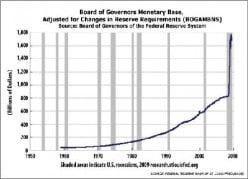How did the US pay for WWII?
Think about it. The National Debt as a percent of the GDP (Gross Domestic Product) under FDR went from 50% of GDP to 120% of GDP. Where did the money come from?
We are currently financing the deficit by borrowing from China (mostly). The US didn't borrow the money it spent on WWII, unless you consider it a loan from the US to the US. People freak out if the hear the US is printing money not backed by gold in Fort Knox. But WWII was financed entirely with paper money printed out of thin air, and it didn't result in hyperinflation. Quite the opposite - the 2 decades following World War Two were arguably the best 20 years for the middle class in the history of the USA.
Tax rates for the richest in the USA in this golden time were over 90% - think about it - and the country flourished.That was before I was born, but I remember reading in history class about the tremendous push to buy war bonds. My parents had some when I was a kid.
That's true - but in the war, most people were indirectly in the employ of the government with war-related jobs.So they were buying bonds with paper money printed from thin air.
Ah, now I see what you're driving at! It's all a chimera isn't it!
It's a riddle, for sure. We treat the 'laws' of economics like they were natural laws as inflexible as the law of gravity. Obviously the USA broke some major laws of economics with no serious ill effects. The US did not have the wealth to conduct WWII. The US did not borrow the money from a second country to produce the war goods - it just printed paper money to pay war bills and ran up a huge debt to itself which it paid of in high taxes to the richest Americans. All of these are 'sins' of modern economics.
Is there a lesson here for our current economic situation?
The major difference being that people would actually save money back then, rather than cripple themselves with personal debt. One of the causes of the financial crisis was the high levels of personal debt effectively meaning that there was nobody left to borrow money to pay for their cheap Chinese imports. A GDP is an annual statistic, money saved from revenues in the years prior is not counted (as you well know). Everyday Americans today would need to borrow money to lend money. Another example of the financial system committing suicide, they lent money to so many people that there was nobody left to borrow from.... with the exception of China... you borrowed money from China, to lend to your citizens, who subsequently purchased goods from China. Americans could afford to buy bonds because they had savings, modern day Americans would perhaps say that they cannot afford to buy bonds because they have crippled themselves with credit card debts.
Very true and very unpopular to say. Many in the US today are NOT willing to accept any level of responsibility. We are divided for the most part into two neat groups. One side says it's primarily because of the big bad government and it's endless expansion. To them the answer is budget cuts and program cuts. The other side says it's primarily big bad business and the solution is more government regulation and heavy taxes on the rich. Personal responsibility is NOT popular here. I don't know what it's going to take for us to wake up.
They paid by lend-lease which means you actually charged the rest of the world for getting stuck in.
The UK finally discharged its debt to the US in 2006!Lend-lease was about 50 Billion in 1940's currency - less than 20% of the US cost of the war.
That's not the way I understand it. According to Wikipedia most of the cost of the materiel supplied to Britain, Canada, Russia and other countries. Here's part of the Wikipedia entry on lend lease:
There was no charge for the Lend Lease aid delivered during the war, but the Americans did expect the return of some durable goods such as ships. Congress had not authorized the gift of supplies after the war, so the administration charged for them, usually at a 90% discount. Large quantities of undelivered goods were in Britain or in transit when Lend-Lease terminated on 2 September 1945. Britain wished to retain some of this equipment in the immediate post war period. In 1946, the post-war Anglo-American loan further indebted Britain to the U.S. Lend-lease items retained were sold to Britain at 10% of nominal value, giving an initial loan value of £1.075 billion for the Lend Lease portion of the post-war loans. Payment was to be stretched out over 50 annual payments, starting in 1951 and with five years of deferred payments, at 2% interest.[26] The final payment of $83.3 million (£42.5 million), due on 31 December 2006 (repayment having been deferred in the allowed five years), was made on 29 December 2006 (the last working day of the year). After this final payment Britain's Economic Secretary to the Treasury, Ed Balls, formally thanked the U.S. for its wartime support.
http://en.wikipedia.org/wiki/Lend-LeaseAgreed. The US used money to influence world politics. Where do you think they learned such a thing?
Indeed, we have made our collective beds.....
To an extent they charged their allies for their help through land lease. It was not classed as a charge but as the debt has only just been paid off it must have been a high amount.
They also sold war bonds to their own people, but I don't know what they cost or how the system worked.The way US Bonds worked was you gave the govenment cash and they gave you a 'bond' which was a certificate which promised that at maturity (20 years, usually) the you could 'cash' the certificate for more than you paid. In this way some of the cost of the war was deferred to the future when the bonds were cashed in. But it was still money printed out of thin air, even if the cost was somewhat amortized.
Thanks - I assumed there would be some sort of cash in policy but not sure of time scale. Do you know if people actually cashed them in and if they were worth more than they paid. Sorry if it seems like I am using you as my own Wikipedia ;-)
The yield on a US War Bond was less than 3%. I expect most were cashed but some are available for sale now as antiques.
http://www.u-s-history.com/pages/h1682.html
BTW, I am quite willing to do research for honest questions, which your question was, on forum topics where I offer opinions.They cashed the bonds in after the war and bought cars with the money. As the auto industry converted from war production to car production there was a huge demand for new cars. Everybody had been driving cars from the 1930s throughout the war. I'll never forget when my dad came home with a brand new Oldsmobile with an automatic transmission. There was incredible pent up demand for cars, washing machines, dish washers, housing, etc, thanks to what amounted to forced savings during the war.
Suggest you read the Wikipedia entry on World War II lend lease:
http://en.wikipedia.org/wiki/Lend-Lease
Doug, don't forget, the US bought up a lot of the war debt world wide during and after the war. This put the US in the position that we have been in. That is the worlds bank. US currency from the end of the war until now has been KING. That's changing, rapidly. Once the US is no longer the defacto currency of the world our paper will become increasingly worthless.
I agree with you that spending cuts alone aren't a complete solution without addressing revenue concerns. However, we would be mistaken to not see what is right in front of us.....When the Arab world stops trading oil in dollars we are in BIG TROUBLE.Correct me if I'm wrong, but didn't the US army hire out it's services to the UK - to put it bluntly the UK have been paying for some time? (Not that I have a problem with this, but I think some historical facts may have been overlooked)
£4.5 billion in 2009 supporting US forces in Afghanistan and Iraq.
To clarify, is Garystuff saying the US is paying the UK for its military services, or that the UK is paying the US for its military services? It's unclear to me.
(Perhaps the disconnect is in the closeness of the usage "I'm hiring myself out as a ...." and the phrase, "I need a job done, but haven't time to do it myself, so I'll hire it out.")Jeff, I think he makes it clear by saying the UK has been paying.
Yes, of course you're right. That's what I get for trying to multitask.

My mistake. I thought we were still talking about WWII. Sorry.
You know, George Carlin used to say The American Dream is a nightmare...you only believe it if you're asleep. (something like that)
It takes a long time to see the "dream" for what it is...given the way the rosy picture is pushed at us since birth.
This country has become a horror show. And it's going to take a lot of REAL patriots to save it. Because there are people who don't give a Rat's Ass about America...usually the ones who scream the loudest about their patriotism....
When people say they want the gvt out of their Social Security, it's insanity time.
When they agree that it's good to borrow 7000 billion more to add to the deficit so uber wealthy people can hoard more wealth--while our country crumbles, it's time to put on the rubber hats.
When they want to make foreign aid to a rogue gvt permanent...who have brutalized a whole group of people, with our help!!... while our people are living in shambles...it's time to acknowledge that the crazy train has left the station!!!!! Chooooo Choooooo the Beckles and Klannity Show Express.
(did you know, ALL our problems are caused by islamic communist liberals?) (that is the New World Order...did you know?)
Just ask yourself one simple question about anyone offering a solution.....Cui Bono?????
Is it for the people of America, or not? And not just the top 2%....ALL of the people of America!let's see...
The 3rd Central Bank of America was created in 1913 (a horrible year for freedom).
That central bank didn't start going nuts with using money until around 1920. But between 1913 and 1920, it relaxed reserve restrictions to the point where the money supply basically doubled in under ten years, and interest rates plummeted.
Of course, if you use idiotic measurements like "GDP" and the sort, this looks like a good thing, but really it was nothing more than theft. It looked like we had "the roaring twenties", but really we were just living beyond our means until the day of reckoning: the worst financial collapse in history.
Benjamin Strong was the head of the Federal Reserve until he died in 1928 (notice, the Fed Chairman died in 1928, and the bust happened in 1929). One thing that Strong wanted to do was to keep the Bank of England running despite it's demanding a Pound that was worth less than it's redemption in gold.
Benjamin Strong pretty much admitted (in 1928) that leaving the gold standard was a huge mistake, and that it would result in the 1929 collapse: "very few people indeed realized that we were now paying the penalty for the decision which was reached early in 1924 to help the rest of the world back to a sound financial and monetary basis." ... which basically translates to "we got hit hard because we wanted to create a worldwide non-gold standard."
Then, unlike every other collapse, the government chose to "solve" the problem. And, unlike every other collapse, this one lasted for about 2 decades.
FDR illegally stole all the gold from citizens in 1933.
Then He launched the biggest "get the economy back on track" campaign ever launched before in history. Then he let us get bombed at Pearl Harbor... Then he launched us into a war that starved half our population.
And the depression (that happened almost 2 decades earlier) didn't fix itself until AFTER the war was over.
and you're wondering why we shouldn't be worried?
We're doing the exact same thingUmm fascinating as a fun-house mirror. Can you explain the prosperity of the mid-40's to the mid-60's? I don't think the fed was abolished then - we were not on the gold standard - and tax rates for the rich - you call it theft - were over 90%.
There were 24 tax brackets back then.
And just about everything that I've read about the 1940s makes it sound like a crappy time to live: no gas, no food, half the people across the world fighting for no reason, no rubber, etc.
When you say "the prosperity", let me guess, you're measuring it via "GDP", ain't ya! All that GDP says is "how much did people spend". It includes -- ta-da! -- government spending. G+C+I+X+M = GDP
The obvious case against GDP is this: The government taxes everyone 100%, then it spends half the money on boats, and half the money on Nukes. Then it puts everyone on the boats, and then blows them all up and kills everyone ==> GDP will look FANTASTIC, but everyone will be dead and life will suck.
Spending isn't what a "good economy" wants. A "good economy" is one that limits scarcity to its minimum amount. And during the 40s and 50s, there were price controls, wanton waste, and scarcity up the wazoo.
The prosperity you speak of only exists in the Keynesian contradicting economic equations, not in reality.No, GDP is not a measure of spending, government or otherwise. Gross domestic product is a measure of how much is produced.
GDP = G+C+I+X-M (I mistyped earlier: it is X MINUS M)
G= Government Spending
C= Consumer Spending (consumption)
I= Investment (spending)
X= Exports
M= imports
(X-M) = how much money came into the country, not out.
GDP is a measurement of SPENDING not production.
Yes yes yes, the P "stands for" production, but guess what!!! It ain't so!!! Just like "the federal reserve" ain't federal!
In case you don't believe me, here's the wikipedia entry: http://en.wikipedia.org/wiki/Gross_domestic_product
Sorry, bud. But ever since Keynes, economics has been focused on demand, and not supply. This is why "bailouts" exist -- idiots like Krugman think that if you buy everything, then life will be better for everyone.Strangely from the same link that you posted-
"The gross domestic product (GDP) or gross domestic income (GDI) is the market value of all final goods and services produced within a country in a given period of time."And yet... it measures that production by looking at how much was purchased.
Look at EVERY SINGLE ONE of the variables - Spending, spending, spending, the difference of foreigners SPENDING and domestic SPENDING.
every single variable measures spending, and each function is addition (subtraction is the same thing as adding a negative).
If you add spending to spending, then your answer can be nothing but spending. GDP measures spending, no matter what others say.
Your argument is nothing more than this: "Sure, it's spending added together 5 times, but the name is Production, so it must be production!"
Look at the variables for yourself. Look at the math by yourself. Reach your own conclusion.
Just replace "spending" with "miles":
G= Miles ran
I = miles driven
C= miles boated
X-M = miles on an airplane
... then you go on to argue that it's measuring velocity....
This is nonsense.
It measures spending.Oh look at Evan, he's the only one marching in step, everybody else is out of step.
Just like Copernicus.
Me: "If you add up 'spending', and end up with 'production', then you've done something wrong"
you: "but the word in the title says 'production'! Also, you're saying something that's different from other people! Bah, you're wrong!"
I dunno about you, but when I buy a coke at McDonald's and they give me a root beer, I ask for my money back and tell them they're wrong. I guess you just drink it and convince yourself that it's coke?
Sorry bud, accuse me of ThoughtCrime all you want, 2+2 does NOT equal 4.
Good luck with your herd mentality. Hope the pack leader ain't heading for a cliff."Just like Copernicus."
Or Lyndon LaRouche.
Iconoclasm is not evidence of being right.Whoa whoa whoa, why didn't you call HIM out because he was calling my argument flawed simply because many other people disagree with him?
My argument with that statement about Copernicus was simply to say that he shouldn't use "the majority" when deciding what's right or wrong.
Bias?"Whoa whoa whoa, why didn't you call HIM out because he was calling my argument flawed simply because many other people disagree with him?"
I'm going to assume you meant "because many other people agree with him."
First, when a lot of folks agree on something, it's often because of a preponderance of evidence. Consensus isn't proof, but proof builds consensus. When someone says, "NO, you guys are all wrong! It's actually this way!" then he's got a lot of proving to do before he builds a new consensus. Even though "Most people believe it, therefore it must be true," is terrible logic, it's not a bad rule for decision-making. Just like Newtonian physics, though known to be flawed, usually works anyway, so we might as well use it where it works.
Usually, the old consensus existed because the information available when the consensus was built points to the inevitable conclusion. But when new data becomes available (more powerful telescopes allowing us to see farther, for example) evidence crops up that indicates the old consensus (in this case, that the Milky Way is the universe and there is nothing else) might be wrong, and that something else (in this case, that the Andromeda Nebula is actually a separate galaxy of its own, which means the universe is bigger than the Milky Way galaxy) is true. But before everyone agrees, everyone's going to have to be convinced that the observations and the calculations are good, that there was no dust on the lens, that Dr. Hubble didn't forget to carry the one, or whatever.
History shows us many events where an iconoclast was eventually proven right and the consensus shifted. We love those stories. (It's even gotten to the point where I've seen a film in which the visionary scientist states his theory, and his listener says, "Hey you might be right." And the scientist says, "But aren't you going to laugh at me?" "Nope." "But they laughed at Einstein! They laughed at Tesla!" "Well, I think you're really on to something here." "Fine, but could you please laugh at me, then?" It was pretty funny at the time.)
But history also tells us that there are many many more events where an iconoclast was never proven anything but an iconoclast. We don't usually learn about them, though, because who cares about a kook who turns out to actually be a kook? Not a very interesting story.
You're right of course that we shouldn't think consensus automatically equals truth, but it's equally dangerous to assume that iconoclasm equals genius.I can agree to that, but his argument was "I'm the majority, thus I'm right".
He couldn't accept that if you add 4 different types of spending, the sum would HAVE To be a measurement of spending.
That's OBVIOUSLY wrong. Sure sure sure, make fun of me for comparing myself to Copernicus (I did so only to highlight the fault in his logic), but I can't POSSIBLY be considered wrong for arguing that X+X+X+X= 4X.
How can GDP be measuring "production" when every single one of it's components is a measurement of "spending"?!
It's like I'm in crazyland.
And if you add up production and come up with spending you've done something wrong!
Don't know what else you are prattling on about, I don't buy coke at McDonalds but if I did I'm quite sure they would count the money they took off me as a credit and not a debit.He's not "prattling" - he's quite right. GDP does include government spending as one of the variables used in its calculation. Which if you give it a moment's thought, is a very good reason why you can't point to GDP as a measure of how well the economy is doing.
And BTW, I absolutely *hate* those graphs littering the Internet showing "national debt as a percentage of GDP". (the ones that show plain "national debt" are a lot harder to find, for some reason...).
I disagree with Evan on a number of things as I know you do, but I think you might benefit from listening to him here, rather than putting your hands over your ears and going "you're a capitalist, so you're wrong!".holy crap, some recognition.
Thanks Felicity.But how can you have a graph showing national debt as a percentage of GDP when you and Evan are telling me that they are the same thing?
GDP and national debt aren't precisely the same thing. But government spending IS one of the variables that goes towards calculating GDP. I don't pretend to be an expert in economics but even based on my knowledge of the subject, to call something "production" and use something that's the opposite of production in its calculation is just plain stupid, if not deliberately misleading. Very like Orwell's 1984, indeed.
It's a bit like an algebra thingie where you say "calculate X as a percentage of [X + Y]" - it's mathematically possible, but in the real world, in this particular context, it simply doesn't make sense.exactly!
How can you add up 4 different forms of spending, and then call it production?
It is absolutely incorrect.
if you divide nation debt (a measurement of PART of government spending) by GDP (which is the economy's TOTAL spending), then all you discover is how much of the total spending in the Economy was done by the government issuing bonds.
That's really all that it means: "out of all the money SPENT in the economy, how much was spent by the issuance of government bonds?"Shakes head!
I thought you said you had nothing more to say!...That's a great argument...
I was done talking about X+X = 2X debate we were having.
You brought up a new discussion about X /(X+Y+Z).
It was a new discussion.
...
... Now, did you have anything to say about it? or were you just going to troll me some more?Quote: "But how can you have a graph showing national debt as a percentage of GDP when you and Evan are telling me that they are the same thing?"
Your question asked how X+X=2X is different than X/(X+Y+Z)Well, I believe you, mind you, I wouldn't believe just anybody who told me that!
your argument makes no sense, and I'm beginning to wonder if you're simply trolling me.
Last time I'm going to say this
Distance + distance + distance =/= velocity
Spending + spending + spending =/= production.Likewise, your argument makes no sense either, I mean, come on, distance = spending!
Personally, I think you're trolling.distance... doesn't... equal... spending... ?
I never made that claim.Now it looks like you're deliberately misunderstanding, John.
Not deliberately Jeff, the logic genuinely escapes me.
GDP consists of 4 components
All four of those components are measurements of certain types of spending.
One of those types of spending is "government spending".
If you add four different types of spending together, the sum can do NOTHING but measure spending.
Thus, because GDP's components are nothing but measurements of spending, GDP can NOT be a measurement of PRODUCTION.GDP (Y) is a sum of Consumption (C), Investment (I), Government Spending (G) and Net Exports (X - M).
Y = C + I + G + (X − M)
How, for instance are exports measured by spending?net exports is a dollar price that addresses how much money was spent by foreign capitalists vs. how much money was spent by native capitalists.
it's a relic of mercantilism, and it is a form of spending.
TO measure production, you would have to measure the total created number of items and services in an economy, and then (in order to put a dollar value on those items and services) multiply each item by their dollar value.
Production example: 80,000 Acme Screws were made, each one cost $0.30, and thus the net production was $24,000. Acme also bought 2 tons of steel from a foreign seller, but this isn't really production, so we ignore it.
GDP (spending) Example: only 70,000 were sold, but of that 70,000, only 60,000 was sold abroad for $0.30/ea, thus Acme only "produced" $18,000. BUT! Acme also bought 2 tons of steel from a foreign producer - at $1,000 / ton - and so we must subtract $2,000. The amount of "net exports produced" is only $16,000.... despite the fact that it literally produced $24,000 worth of screws. The other 10,000 sold to native capitalists would be calculated under C or G (depending on who bought it), but the remaining 10,000 just goes unmeasured.
As you can see, Acme PRODUCED 80,000 but only SOLD 60,000 -- GDP, however, measures the difference between the amount sold and the amount bought, not the amount produced.
Obviously, they paid for WWII by skimping on butter, and having used tire drives. Duh!
"However, these agencies were often quite successful in achieving their respective, narrower aims. The Department of the Treasury, for instance, was remarkably successful at generating money to pay for the war, including the first general income tax in American history and the famous
{{{"war bonds"}}} sold to the public. Beginning in 1940, the government extended the income tax to virtually all Americans and began collecting the tax via the now-familiar method of continuous withholdings from paychecks (rather than lump-sum payments after the fact). The number of Americans required to pay federal taxes rose from 4 million in 1939 to 43 million in 1945. With such a large pool of taxpayers, the American government took in $45 billion in 1945, an enormous increase over the $8.7 billion collected in 1941 but still far short of the $83 billion spent on the war in 1945. Over that same period, federal tax revenue grew from about 8 percent of GDP to more than 20 percent. Americans who earned as little as $500 per year paid income tax at a 23 percent rate, while those who earned more than $1 million per year paid a 94 percent rate. The average income tax rate peaked in 1944 at 20.9 percent ("Fact Sheet: Taxes")."Then why do they say that we are paying the highest rate of taxes in history, that the Democrats are taxing us to death, when income taxes were so much higher years ago...and while a Republican (Ike Eisenhower) was president.?
I think you've answered your own question!
"Then why do they say that we are paying the highest rate of taxes in history,..."
Because they lie, otherwise known as propaganda.Speaking of "revenue concerns" I heard recently that the great tax cutter, Reagan, raised taxes eleven times after it became apparent that he'd gone too far on his original tax cut because he didn't succeed in "starving the beast." He was a practical man who had a cordial relationship with Tip O'Neill, speaker of the House.
I noticed that the left is tiring of blaming Bush for everything and has now decided to move even further into the past. The moto today is "Blame Reagan!" Funny, you and I both know that the Congress has so much more to do with policy than any sitting President. As you mentioned, Tip O'neill was running the country back then.
Doug, your oversimplifying the issue. At the end of WWII the industrial centers of Europe and Japan had been bombed into oblivion. The US was the last man standing. That meant that the industrial centers in the US needed to covert from war time production back to commercial production in order to supply not only the nation, but the world. The US used this position to their advantage. The taxes on the rich were used for loans and grants to the nation and the rest of the world. We leveraged our money around the world and emerged as the most dominant force in the world. At the end of WWII we were making the loans, today we are the recipient of them....
I absolutely admit I oversimplified. The point I wanted to make is a simple one, though. The USA violated economic principles which various groups today want to say are absolute. Economics is more an art than a science, and some VERY talented economic artists produced some amazing results taking a country in the depths of a depression and turning it into an economic goliath. IMO, we are limiting our opportunities to extricate ourselves from a persistent recession by being bound to economic dogma that might not be valid.
If you mean by dogma "don't raise my taxes, just cut spending" I think your correct. At some point taxes will have to be raised. We have to clear the debt and clear it fast. Things in the WORLD economy are changing. If we are still swimming in debt we will be left behind.
The Great Depression was caused by the stock market crash of 1929. This crash wasn't even the biggest crash the country had endured -- the year 1918 had a bigger one.
BUT! Unlike 1918, the government demanded that it "solve" all the problems -- this was the first time it ever tried to fix the economy.
And guess what?! It was the first time that a recession lasted 2 decades.
The answer is pretty simple:
The US paid for WWII with deficit spending.And with HIGH taxes. In an enviroment that allowed them to do so. The enviroment today is completely different.
How did the US pay for WWII? It didn't. The debt is still owed.

Yup, and that debt is called "Cash." Here's another good WW2 question: How come Germany and Japan are now, pre capita, richer than America?
Easy, because both invested heavily in their manufacturing technologies post-war whilst the US and the rest of Europe moved towards a tiertary service-based economy. It has nothing to do with the war, it has everything to do with strong government policies. Lose your primary or secondary industries and you create a domino effect.
Actually, I would be interested to know what technique you used to determine that the Japanese and Germans are richer than Americans though, the GDP per capita for US citizens is far higher than that of German citizens or Japanese Citizens, as per the CIA and the IMF. Did you make this up on the spot because it sounded good? Do you think that the Japanese have it easy? They have effectively had zero growth for decades now.I looked at median income, life expectancy, education level, personal savings rate, personal debt load, government services (like, I got to add the value of their Gubment healthcare to their personal incomes, if I want to compare their personal incomes to American personal incomes) stuff like that. America seems well-off on average per capita divided into GDP because the gazillionaires took all the money for themselves. Take out that top 1% and we're not doing so well.
Exactly. That's because the "gazillionairs" have the capital to set up shop else where. When they don't do it here we don't see the residual profits of their business activities.
TO measure production, you would have to measure the total created number of items and services in an economy, and then (in order to put a dollar value on those items and services) multiply each item by their dollar value.
I'm with you so far.
Production example: 80,000 Acme Screws were made, each one cost $0.30, and thus the net production was $24,000. Acme also bought 2 tons of steel from a foreign seller, but this isn't really production, so we ignore it.
We ignore the amount spent on the raw materials used to produce the screws. Okay, but someone produced those raw materials, right? Does the steel production get captured at the smelter, then?
GDP (spending) Example: only 70,000 were sold, but of that 70,000, only 60,000 was sold abroad for $0.30/ea, thus Acme only "produced" $18,000. BUT! Acme also bought 2 tons of steel from a foreign producer - at $1,000 / ton - and so we must subtract $2,000. The amount of "net exports produced" is only $16,000.... despite the fact that it literally produced $24,000 worth of screws. The other 10,000 sold to native capitalists would be calculated under C or G (depending on who bought it), but the remaining 10,000 just goes unmeasured.
Oh, we're assuming a foreign steel supplier.
So if Acme sells screws to companies overseas, it's better than if they sell screws to a domestic company, in that the screws are being used by people here and not there? Or that money (not screws) is coming in, and stuff, not money, is going out.
As you can see, Acme PRODUCED 80,000 but only SOLD 60,000 -- GDP, however, measures the difference between the amount sold and the amount bought, not the amount produced.
If we're trying to measure production, why do the 10K unsold (but certainly produced) screws not count?
Or does production only count if someone uses the product (and pays for the privilege)?I think you might've missed a step, but I can hardly blame you... that whole example I typed was poorly written.
My argument was simply this:
If you make 80k screws, but only sell 60k, then GDP only measures the 60k BECAUSE IT MEASURES SPENDING, NOT PRODUCTION.
The part that got confusing was when I tried to put it into the frame of "X-M".
To go even further, those extra, unsold 20k screws had an impact on the economy!! Because they were PRODUCED, and the ACME wanted to sell them, they likely lowered their prices to try to get rid of them. Thus, the 60k that were sold were sold at a lower price BECAUSE ACME produced MORE than they could sell. And IN SO DOING, they made the price of screws go lower than if they had only produced 60k.
Production is different than spending because Production influences spending and spending influences production.
They are correlated, but not the same.
Jeff - This is just a bit ridiculous. GDP is not a metric I just made up - it's been in use since 1934, and is still used by all major economists. This sophistry is a fraud - to avoid the topic of the post.
Specifically - the national debt was higher after WWII than it is now if you compare the debt as a ratio of total national economic activity. That's GDP. We created that debt in WWII by just printing money and signing an IOU from the USA to the USA. We paid down that debt with high taxes on the wealthiest Americans for decades and the result was not inflation, or poverty. The 20 years which followed WWII were arguably the best economic times the USA has had. That reality is what what conservatives and libertarians choke on.
So Evan wants to split hairs about the components of the GDP and ignore the post. BULL! It's a deliberate con and you are going for it!!!The only argument using sophistry here is yours. Also, I'm not avoiding your argument, I'm lambasting it head first: I'm claiming that your entire argument is supported by completely unreliable data. It's not "splitting hairs", it's pointing out the fact that you've been duped by Keynesians. They idiotically argue that spending leads to prosperity.
But this is obviously nonsense. You can't buy a 2-way ticket to a beach-side paradise unless people have PRODUCED an airplane, PRODUCED a hotel, PRODUCED bikinis, PRODUCED margaritas, and PRODUCED a little seat for you to sprawl yourself on.
Prosperity is SUPPLY, consumption is DEMAND. You're claiming the opposite by using GDP.
You're measuring "prosperity" (which by definition would mean production because you can't have paradise without the stuff you want) using "spending".
And the tool that you use to measure this "spending" INCORPORATES GOVERNMENT SPENDING.
Thus, when I say "they stole all our money, and then blew it cheap whores. This isn't good for the economy"...
... then you can say "yes it is! Look at the GDP! The 'G' part really went up! Thus we were all happy!"
The only sophistry is from the Keynesians who argue that X+X=/=2X. Sure GDP has been used for almost a century, but you must understand that it does NOT measure production, it measures spending.
I'm not dodging the issue, I'm not splitting hairs, and I'm not using sophistry. I'm pointing out that your argument is flawed.
I will never admit that 2+2=5I'm old enough to remember the 'Paris Peace Talks' where a truce in Vietnam was prolonged by an endless debate about the shape of the table delegates would sit at. This is the libertarian version of the same thing - except you won't address the theme of the OP which I have repeated and repeated because you want to recite the talking points from Mises.com which always misses.
The economic principles you tout as if they were the law of gravity were broken to smithereens and the result was the self-evident prosperity for the middle class that lasted for 20 years.the theme of the OP is that "life was great back in the 40s and 50s despite massive taxation"
I argued that you were measuring a good life through GDP.
Then I argued that GDP is a measurement of SPENDING, not production.
and then went on to say that Production is a more important way to measure prosperity than spending.
I'm not splitting hairs. I'm not missing the point.
Austrian Economics does NOT fail to explain the middle class. But you obviously care not to hear the argument. I'm done with this thread.
I'm making valid points, and people seem more interested in calling me loony than actually addressing them.
If you don't want to address the mistakes, then go ahead and ignore them. I'm done wasting time here."I argued that you were measuring a good life through GDP."
You very deliberately missed the point. You don't (and I didn't) measure gains in the standard of living with the GDP. It would be like making liquid measure in miles. The change in the quality of life from the 30s to the 40's is evident - moving from massive unemployment, tent cities and soup kitchens to stable jobs, home ownership and affluence is an historical fact.
The national debt expressed as a percent of GDP is a way of comparing debt levels in different times and of different countries with different currencies. The FACT is the national debt was higher in '44 than it is now - and it was addressed with high taxes during a period of prosperity for the middle class.
The claim that you can't print money out of thin air without massive inflation is not always true. The USA did it to finance the entire war. The argument that you can't spend your way out of a depression is false, because the USA did. The argument that high taxes on the affluent is bad for economic growth is completely refuted by the history of the period.
Picture a scholar just after 1900 explaining that a heavier than air craft can not fly - while the Wright Bros. flyer is in the air behind them and you have a picture of modern conservative economists and libertarian economic witch doctors - postulating that what HAS happened can't be done.
And then the cheap whores spent their money in the private sector producing wealth and employment.
Related Discussions
- 43
The Great American Divide: Gratitude vs. Bitterness
by Sharlee 2 months ago
There was once a time, not so long ago, when Americans disagreed over policy but shared a common love for country. That time has passed. Today, it feels as though we are not simply two parties or political factions, we are two different nations coexisting uneasily within the same borders. The...
- 497
Why do so many Americans hate America? And if they hate it so much why don't the
by TheWorldNow 6 years ago
Why do so many Americans hate America? And if they hate it so much why don't they just leave?One thing that really bothers me is the way some Americans seem to hate everything about America. I'd just like to ask them: "If you hate everything about the country you live in then why are you...
- 160
Is It Time That America Cuts Itself Off From The Rest?
by Raymond D Choiniere 14 years ago
Hey Americans,Just curious what you think. Is it time for America to close it's borders, shutdown economic aid around the world, build it's infrastructure, such as more stable housing complex, more structure railing(traveling system), cut off imports to extreme necessary items, re-vamp the...
- 15
Why are Americans so angry at the present administration? Is it misplaced anger
by Sandria Green-Stewart 15 years ago
Why are Americans so angry at the present administration? Is it misplaced anger from the last 4 yea
- 158
Trump and GOP to slash Medicaid just to line pockets of Fat Cats?
by Credence2 7 months ago
In the ongoing war Trump and Republicans wage on the poor, here is the next installment.After listening to Trump whine endlessly about "Obamacare" saying it needs to be repealed for something better, all we received was a "nothing burger". Now he shows us all what his ideas of...
- 18
What is the single greatest threat to America?
by Education Answer 13 years ago
What is the single greatest threat to America?



















